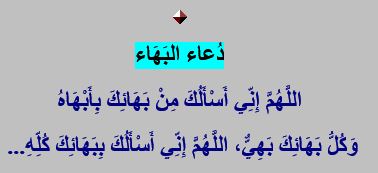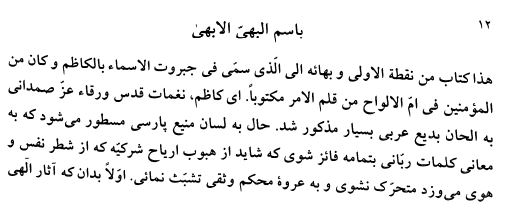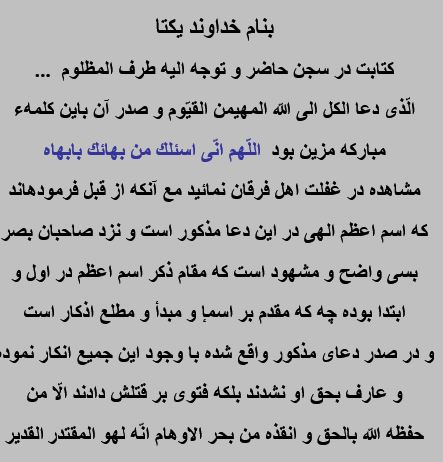
The opening lines of the Dawn Prayer of Muhammad al-Baqir.
O my God!
I beseech Thee by Thy Bahā' (Splendor) at its most splendid (abhā')
for all Thy Splendor (bahā') is truly resplendent (bahiyy).
I, verily, O my God! beseech Thee by the fullness of Thy Splendor (bahā').
Baha'-Allah and the Shi`i Du`á al-Saḥar (The Dawn Prayer) attributed to Imam Muhammad al-Baqir (d. c.126/743).
Early Lambden Beta trans from old UK Website:
The prayer cited above and fully translated and commented upon elsewhere on this website, is ascribed to the fifth Imam Muhammad al-Bāqir (d. c.126/743) and exists in several versions. The text can be found in numerous Twelver Shi`i devotional compilations often in sections dedicated to the Ramaḍān period. Perhaps its most famous printing is in the Mafatīḥ al-Jinān ("Keys of the Paradises") a very large (795 pages + indexes) devotional compilation by the twelver Shī`ī scholar Shaykh `Abbās al-Qummī (d. 1319/1901). In various of the numerous editions and printings of this book the Du`ā' al-Saḥar is referred to and indexed as the Du`ā' al-Bahā' (lit. `The Supplication of Splendor-Glory-Beauty'). In introducing this supplication al-Qummī writes, outlining the pious actions to be carried out during Ramaḍān period,
"One should supplicate by means of the Mighty, Substantial Devotional (al-Du`ā' al-`azim al-sha`n) which has been transmitted by [the eighth Imam `Alī ] al-Riḍā' [d. 203/818]... He stated, "It is the Supplication (al-du`ā') of [the fourth Imam Muhammad] al-Bāqir [d.c. 126/743] for the dawn times (asḥār) of the month of Ramaḍān" (Mafatih, [reprinted] Beirut: Dār Iḥyā al-Turath al-`Arabī, 1422/2001, p.221).
Different versions of the Du`ā' al-Saḥar/Du`ā' al-Bahā' are footnoted by al-Qummi in his Mafatih al-Jinan. He writes: "We are found a transmission from [Imam Ja`far] al-Sadiq [d.c. 148/765] in the Du`ā' yawm al-Mubahalah ["Supplication for the Day of Mutual Execration] which differs from the above [printed text]. Note also the differences between the recension (nakhsh) of the Shaykh [al-Ṭā`ifa = Abu Ja`far Muhammad ibn Ḥasan al-Ṭūsī (d. 460/1067)] and the recension (nakhsh) of the Sayyid [Add] (p.221 fn.1). These two aforementioned Shi`i authorites, al-Ṭūsī and al-Sayyid [ADD] then cite somewhat different versions of the Du`ā' al-Saḥar/Du`ā' al-Bahā'. The naskh of the Sayyid is probably that contained in the مصباح المتهجد Misbāḥ al-Mutahijjad [al-Kabir] ("The [Greater] Lamp of the Nightly Vigil") of al-Ṭūsī....
As far as the text of the Du`ā' yawm al-Mubāhalah -- printed, for example, in the Mafatīḥ al-Jinān see ed. cited pp. 320-323 and the Miṣbāḥ of Taqī al-Dīn al-Kaf`āmī (d. 900/1494-5) editions Beirut, 1414/1994, pp. 911-918 and Beirut, 1425/2004, pp. 879-881) -- transmitted by Ja`far al- Ṣādiq see my note and translation at :
The Du`ā' al-Saḥar is recited by Shi`i Muslims at dawn times during the fasting month of Ramaḍān. This amazing prayer was very precious to the Bab who quoted or re-revealed it numerous times in his Kitab-i Panj Sha`n (Book of the Five Grades) and Kitab al-asma’ (Book of Names). His naming of the months of the Babi-Bahā'ī year is closely related to various of the divine attributes found within this and related versions of the Dawn Prayer.
The first line of the Dawn Prayer of Muhammad al-Baqir (see above), contains no less than five terms derived from the same triliteral root from which the verbal noun bahā' and the superlative abhà (all-glorious) is derived, including bahiyy (= `resplendent', `radiant', `glorious', `luminous', etc.). Bahā'-Allāh drew attention to this in a number of his Arabic and Persian scriptural Tablets.
Examples of Babi-Baha'i basmala openings drawing upon the Du`a al-Sahar.
The Bab changed the Islamic basmala from bismi'llah al-rahman al-rahim, “In the name of God the Merciful the Compassionate” to “bi-ism Allah, al-amna` al-aqdas,” "In the name of God, the Inaccessible, the Most Holy.” Baha Allah, likewise, thousands of times, recreated and refashioned the basmala at the commencement of his scriptural Tablets. Many of these new basmala openings are influenced by the opening words of the Shi’i Ramadan Dawn Prayer, incorporating the words Baha' /al-Baha' (glory, splendor…), Bahiyy /al-bahiyy (splendid, luminous, glorious...), and Abha /al-abha (All-Glorious, Most splendid, etc.). This sometimes in line with the original baha' related Dawn Prayer opening.
One of the most important printed volumes of scriptural Tablets of Baha'-Allah is that complied from writings addressed to the Shaykhi, Babi and Baha'i background disciple Muhammad Kázim Qazvini or Shaykh Kazim Samandar (d. Qazvin, 1918) as well as certain of his relatives. Entitled Ayat-i bayyinat ... , this compilation of Arabic and Persian writings, includes texts with a number of basmala and other passages within short epistles of considerable interest. One such four or so page Arabic Tablet ( no. 12) contained within in the Ayat-i bayyinat (pp.10-13) is a letter or "book" of Baha-Allah which commences ( like many others) with an echo of the Shi`i Ramadan Dawn Prayer :

In the Name of God,
the Splendid, the All-Glorious (bismi'llah al-bahiyy al-abha)!
This is a letter from the Primal Point (nuqtat al-ulya) and His Baha' (Splendor-Glory...) unto he who was named in the Empyrean of Names (jabarut al-asma') as [Muhammad] Kazim [Samandar]. He was indeed reckoned one of those written down in the Archetype [Mother] of the scriptural Tablets (umm al-alwah) by the Pen of the Cause (qalam al-amr) as one of the believers. O Kazim! The breezes of holiness of the Mighty, All-Enduring Dove (varqa') repeatedly maketh mention of thee in wondrous Arabic melodies.
Miscellaneous Du`a al-Sahar opening rooted phrases and benedictions.
We have already noted that Bahā'-Allāh several times specifically commented upon the Arabic Ramadan dawn prayer. He frequently cited or alluded to it. We again give a few examples from passages within his Tablets addressed to Samandar. There exists, for example, writings in which sections of the first line of the Ramadan Dawn Prayer are quoted or refashioned. Referring to Samandar in one Tablet Baha’u’llah states:
if the substance of this letter were sent to the beloved of the inmost heart of his eminence Samandar, may the fire of divine love be upon him, through all of the Bahā' (glory) at its most splendid (abha-hu) ... (Ayat-i bayyinat, No. 152 pp.[209-10], 209).
Another slightly variant example is found within a section of text extant within a ms. Tablet of Baha'u'llah to Hadrat-i ism-i Zayn [al-Muqarrabin] dated 18th Dhu'l-Hijjah 1300 (=18th October 1883 CE):

... His eminence Ism-Allah jim-mim ["J" "M" = Jamal = Jamal-i Burujirdi (?)], upon him be of the fullness of Bahā' (Splendor) at its most Splendid (abhā'-hu)..." (Brit. Library mss. Or 15700, 4).
In many of his Arabic and Persian scriptural Tablets (alwāḥ) Bahā’-Allāh cites or partially cites the opening lines of the Ramadan Du`a al-Sahar. He often draws on or utilizes its phraseology or terminology in benedictions upon Babi-Bahā'i persons. In an untitled Persian Tablet headed `He is the Powerful, the Transcendent, the Sanctified, the Exalted, the All-Glorious', a benediction is uttered upon the young Bahā'i martyr Āqā Buzūrg-i Khurasānī (executed 1871 CE) who was entitled Badī` ("Wonderful") the Du`a al-sahar is cited though slightly modified as a phrase (the 2nd person suffix and the bi are omitted) `alay-hu min kull bahā' abha-hu ("upon him be all the Bahā' at its Most Splendid (abhā).
An untitled Arabic prayer of Bahá'u'lláh
There exists an Arabic prayer of Bahá'u'lláh -- headed "In the name of God, the All-Glorious (al-Abhá)" -- which opens with reference to the Shí`í Dawn Prayer, the first line of which it subsequently quotes. By means of this Dawn Prayer, God had been supplicated, Bahá'u'lláh meditates, by the tongue of His Messengers (rusul), beseeched through the "tongues of those who are nigh unto God". All, in fact, were commanded to recite it at dawntimes for it contains the "Greatest Name" and is a protection against being veiled from that Name (Bahá') which is the "ornament" of God's "Self". (see AQA, Majmú`a-yi munáját 45-46). [22]
لوح ميرزا عباس استراباد
Extract from a Tablet of Baha’u’llāh to Mīrzā `Abbās Āstarābadī about the Greatest Name of God (Per. ism-i a`ẓam)..
Tablet to Mírzá `Abbás of Astarábád

Persian text from Mā’ida-yi Āsmānī, Vol. 4: 23
In a Persian Tablet to Mírzá `Abbás of Astarábád sometimes referred to as the Lawh ism-i-a`zam ("Tablet of the Greatest Name"). Bahá'u'lláh quotes from the beginning of the Ramadan Dawn Prayer and observes that the "people of al-Furqán" (= Muslims) have not heeded the fact that the "greatest name" was said to be contained within it; indeed, at its very beginning! (refer Má'idá 4:22-23 cf. ibid, 7:97). [22]
In a Persian Tablet to Mīrzā `Abbās of Astarābād sometimes referred to as the Lawḥ ism-i-a`zam, "Tablet of the Greatest Name", Bahā’-Allāh quotes from the beginning of the above quoted Dawn Prayer and observes that the "people of al-Furqān" (= Muslims) have not heeded the fact that the "greatest name" was said to be contained within it; indeed, at its very beginning! (refer Mā’ida 4:22-23 cf. Mā’ida 7:97).
بنام خداوند يكتا
... كتابت در سجن حاضر و توجه اليه طرف المظلوم الّذی دعا الكل الی اللّه المهيمن القيّوم و صدر آن باين كلمهء مباركه مزين بود
مشاهده در غفلت اهل فرقان نمائيد مع آنكه از قبل فرمودهاند كه اسم اعظم الهی در اين دعا مذكور است و نزد صاحبان بصر بسی واضح و مشهود است كه مقام ذكر اسم اعظم در اول و ابتدا بوده چه كه مقدم بر اسمإ و مبدأ و مطلع اذكار است و در صدر دعای مذكور واقع شده با وجود اين جميع انكار نموده و عارف بحق او نشدند بلكه فتوی بر قتلش دادند الّا من حفظه اللّه بالحق و انقذه من بحر الاوهام انّه لهو المقتدر ... القدير
Persian text from Mā’ida-yi asmānī, Vol. 4: 23 translated by Stephen Lambden from the Persian text. published in Mā’ida-yi āsmānī, Vol. 4: 23.
c.1980 revised 2007 - Last revised 17-05-2015.
In the Name of God, the One.
Thy letter arrived in the [Acre/`Akka'] Prison and the gaze of the Wronged One (al-maẓlūm = Bahā’u’llāh) who summoneth all unto God, the Help in Peril, the Self-Subsisting was directed unto it. The commencement (ṣadr) of that [communication] was ornamented with this blessed phrase (kalimat-i mubāraka),
اللّهم انّی اسئلك من بهائك بابهاه
“I, verily, O my God, beseech Thee through Thy Bahā’ (Splendour) at its Most Resplendent (bi-abhā-hu)…”.
Thou art aware of the perfidy of the people of the Criterion (ahl al-furqān) [=Qur’ān = Muslims] despite the fact that they [certain of the Imams] indicated that the Greatest Name of God (ism-i a`ẓam-i ilāhī) is mentioned in this [Ramaḍan fasting] Supplication (du`ā) [of Imam Muhammad al-Bāqir]. And it is abundantly clear and evident on the part of the possessors of insight (ṣaḥibān-i baṣar) that the position (maqām) of the mention [in the Du`ā] of the Greatest Name (ism-i a`ẓam) is at its very opening or commencement. This since it has preeminence (muqaddam) over the [other Divine] Names (asmā’) and is the genesis (mubdā’) and dawning-point (maṭlā) of the [other] commemorative lines [of the Supplication] (adhkar) being mentioned and positioned at the very inception (ṣadr) of the Supplication (du`ā). In spite then of this all repudiated it and remained unaware of its Truth. Nay indeed! They [the Shī`ī] ulamā’ issued a fatwā for his [Bahā’u’llah’s] execution, save, that is, such as were, in very Truth, safeguarded by God and rescued from the ocean of idle fancies. He [God] indeed is assuredly the Powerful, the Potent.
- See also : http://hurqalya.ucmerced.edu/node/424/
An untitled Tablet of Bahā'-Allāh identifying and celebrating the word Bahā' in the Du`ā al-saḥar with himself as the ism al-a`zamm the Greatest Name of God.
بسمي الذي به اشرق نور البيان ...
،اللَّهُمَّ إِنِّي أَسْأَلُكَ مِنْ بَهَائِكَ بِأَبْهَاهُ وَكُلُّ بَهَائِكَ بَهِيٌّ
هذا اسم الله الاعظم الذي اخبر به حجة الله و برهانه ،
لعمري ما ظهر ذكر ولا بيان اصرح من ذلك طوبى، للمنصفين، الملك والملكوت فى فبضة قدرة الله و رب العالمين
هدا اسم ارتعدت منه فرائص المشركينالذي لم تمنعه الصفوف ولا اقوى جنود العالم يفعل ما يشاء ويحكم ما يريد وهو العزيز الحميد واطمئنت به افئدة المقربين، أقبل وقل
In My Name through which the Light of Exposition (nūr al-bayān) hath radiated forth from the Horizon of Possibility (ufq al-imkān).
O Thou who gazest towards the Countenance and are one mentioned before the Throne! Today the Tongue of the Proof in the Kingdom of Exposition (malakūt al-bayān) giveth utterance to this Elevated, Blessed, Word (kalimat-i mubāraka-i `ulyā') :
"O my God! I beseech Thee by Thy Bahā' (Splendor) at its most Splendid (abhā') for all Thy Splendor (bahā') is truly resplendent (bahiyy)..."
This is the Greatest Name of God (ism Allāh al-a`ẓam) which was announced by the proof of God (hujjat Allāh) and His evidence [the messianic Imam]. By My Life! There hath not appeared either any mention (dhikr) nor any evidence (bayān) more lucid (aṣraḥ) than this. Blessed then be such demand justice (ṭubā li'l-munṣifiyyin)! This is a Name through which the limbs of the unbelievers (farā'iṣ al-mushrikīn) hath been made to quake and whereby the hearts of those who are nigh unto God (afida al-muqarrabīn) hath been made tranqil. So draw ye nigh and say: `The Kingdom and the Kingdom of God (al-mulk wa'l-malakūt) are in the grasp of the power of God, the Lord of all the worlds! He it is whom the [ military] ranks (al-ṣufūf) cannot hold back nor the powers of the hosts of the world (junūd al-`alam) overpower him. He doeth whatsoever He willeth and ordaineth whatsoever He pleaseth for He is One Mighty, Praiseworthy" (trans. Lambden from Behmardi, ed. La`ali-yi Ḥikmah II:183).
The above cited and translated scriptural Tablet of Baha'-Allah, clearly identifies the words relating to the Arabic root of baha' in the Dawn Prayer, with the Mightiest or Greatest Name of God (ism Allāh al-a`ẓam).
The Lawh-i ibn-i-Dhi'b ("The Epistle to the Son of the Wolf" c. 1891 CE)
In his last major work of compilation, The Epistle to the Son of the Wolf , Bahā’-Allāh refers to the Shi`i Ramadan Dawn Prayer. He exhorts Shaykh Muhammad Taqī Najafī (d.1914), should he enter the "Crimson Ark" (become a Bahā'ī), to face the "Ka`ba of God" (Bahā’-Allāh) and recite the opening line of the Shī'ī dawn prayer. Were this to be carried out, He promises him, even the "doors of the Kingdom" would be "flung wide" open before the face of the "son of the Wolf". This anti-Bahā'ī cleric did not read this prayer as directed; he never became a Bahā'ī.



